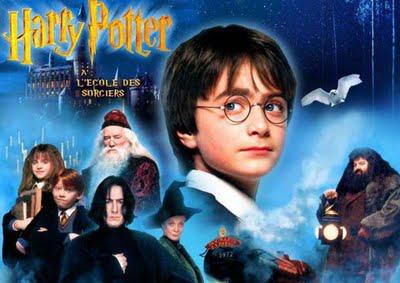"Ahh music. A magic beyond all we do here."--Albus Dumbledore,
from Harry Potter and the Philosopher's Stone by J. K. Rowling

French promotional poster for Harry Potter and the Sorceror's Stone.
Image © Warner Brothers Pictures used here for promotional purposes only.
So this evening I was relaxing at home, watching (for the umpteenth time) Harry Potter and the Sorcerer's Stone (or Philosopher's Stone as it's known outside the U.S.) That's the first movie in the recently completed film series, for you Muggles who read my blog.
Pianist David Pasqualini plays his piano arrangement of "Hedwig's Theme" on the piano, the opening of the Harry Potter score.
I found myself paying particular attention to the movie's score, a gorgeous, Romantic confection by John Williams, which establishes leading motives and themes for the main characters that run throughout the following seven movies. But what was even more interesting was the resemblance of key "Harry" themes to musical ideas heard first heard in the score of Wagner's Das Rheingold.
John Williams has a long history of writing film scores that borrow freely from other composers. And no, he's not the only composer who does that--Wagner himself borrowed from Beethoven on more than one occasion.
Mr. Williams' six scores for the Star Wars movies were directly inspired by the works of Richard Strauss, Gustav Holst and other "cosmic" composers. Discerning ears can also catch bits of Erich Wolfgang Korngold, Carl Orff, and Dmitri Shostakovich in his music.
But the Harry scores (for the first, second and third movies in the series) are among his most Wagnerian works. The opening theme of the movie (commonly referred to as "Hedwig's Theme" after Harry's owl) opens in the distinctive "Nibelung" rhythm that comes to define Alberich and his race of dwarves in Wagner's operas.
Here, you can hear the Wagner theme played in piano transcription by pianist Lennon Aldort.
The second part of the theme, a descending minor melody, actually quotes a phrase sung by one of the Rhinemaidens in the opening scenes of Das Rheingold:
Later, more menacing passages in the film recall the grimmer moments of Siegfried, with stabbing bass trumpet and a slithering theme followed by descending tuba. The whole thing is in a minor key, developed thematically from the opening in a flowing, organic way:
"The Forbidden Forest." Tracking session from the score of Harry Potter and the Philosopher's Stone.
The whole thing just breathes evil. Doesn't it?






